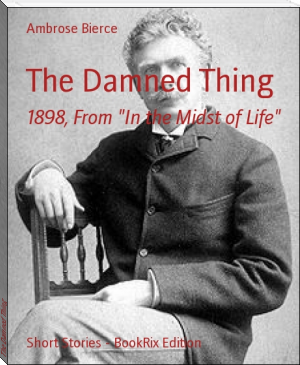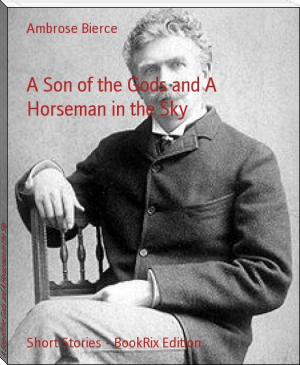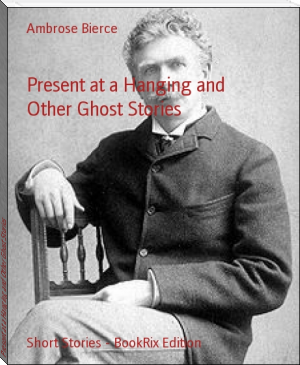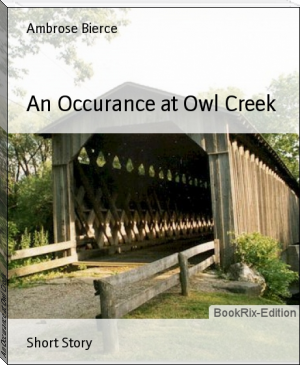Can Such Things Be?, Ambrose Bierce [best android ereader .txt] 📗

- Author: Ambrose Bierce
Book online «Can Such Things Be?, Ambrose Bierce [best android ereader .txt] 📗». Author Ambrose Bierce
THE SECRET OF MACARGER'S GULCH
North Westwardly from Indian Hill, about nine miles as the crow flies, is Macarger's Gulch. It is not much of a gulch--a mere depression between two wooded ridges of inconsiderable height. From its mouth up to its head--for gulches, like rivers, have an anatomy of their own--the distance does not exceed two miles, and the width at bottom is at only one place more than a dozen yards; for most of the distance on either side of the little brook which drains it in winter, and goes dry in the early spring, there is no level ground at all; the steep slopes of the hills, covered with an almost impenetrable growth of manzanita and chemisal, are parted by nothing but the width of the water course. No one but an occasional enterprising hunter of the vicinity ever goes into Macarger's Gulch, and five miles away it is unknown, even by name. Within that distance in any direction are far more conspicuous topographical features without names, and one might try in vain to ascertain by local inquiry the origin of the name of this one.
About midway between the head and the mouth of Macarger's Gulch, the hill on the right as you ascend is cloven by another gulch, a short dry one, and at the junction of the two is a level space of two or three acres, and there a few years ago stood an old board house containing one small room. How the component parts of the house, few and simple as they were, had been assembled at that almost inaccessible point is a problem in the solution of which there would be greater satisfaction than advantage. Possibly the creek bed is a reformed road. It is certain that the gulch was at one time pretty thoroughly prospected by miners, who must have had some means of getting in with at least pack animals carrying tools and supplies; their profits, apparently, were not such as would have justified any considerable outlay to connect Macarger's Gulch with any center of civilization enjoying the distinction of a sawmill. The house, however, was there, most of it. It lacked a door and a window frame, and the chimney of mud and stones had fallen into an unlovely heap, overgrown with rank weeds. Such humble furniture as there may once have been and much of the lower weatherboarding, had served as fuel in the camp fires of hunters; as had also, probably, the curbing of an old well, which at the time I write of existed in the form of a rather wide but not very deep depression near by.
One afternoon in the summer of 1874, I passed up Macarger's Gulch from the narrow valley into which it opens, by following the dry bed of the brook. I was quail-shooting and had made a bag of about a dozen birds by the time I had reached the house described, of whose existence I was until then unaware. After rather carelessly inspecting the ruin I resumed my sport, and having fairly good success prolonged it until near sunset, when it occurred to me that I was a long way from any human habitation--too far to reach one by nightfall. But in my game bag was food, and the old house would afford shelter, if shelter were needed on a warm and dewless night in the foothills of the Sierra Nevada, where one may sleep in comfort on the pine needles, without covering. I am fond of solitude and love the night, so my resolution to "camp out" was soon taken, and by the time that it was dark I had made my bed of boughs and grasses in a corner of the room and was roasting a quail at a fire that I had kindled on the hearth. The smoke escaped out of the ruined chimney, the light illuminated the room with a kindly glow, and as I ate my simple meal of plain bird and drank the remains of a bottle of red wine which had served me all the afternoon in place of the water, which the region did not supply, I experienced a sense of comfort which better fare and accommodations do not always give.
Nevertheless, there was something lacking. I had a sense of comfort, but not of security. I detected myself staring more frequently at the open doorway and blank window than I could find warrant for doing. Outside these apertures all was black, and I was unable to repress a certain feeling of apprehension as my fancy pictured the outer world and filled it with unfriendly entities, natural and supernatural--chief among which, in their respective classes, were the grizzly bear, which I knew was occasionally still seen in that region, and the ghost, which I had reason to think was not. Unfortunately, our feelings do not always respect the law of probabilities, and to me that evening, the possible and the impossible were equally disquieting.
Everyone who has had experience in the matter must have observed that one confronts the actual and imaginary perils of the night with far less apprehension in the open air than in a house with an open doorway. I felt this now as I lay on my leafy couch in a corner of the room next to the chimney and permitted my fire to die out. So strong became my sense of the presence of something malign and menacing in the place, that I found myself almost unable to withdraw my eyes from the opening, as in the deepening darkness it became more and more indistinct. And when the last little flame flickered and went out I grasped the shotgun which I had laid at my side and actually turned the muzzle in the direction of the now invisible entrance, my thumb on one of the hammers, ready to cock the piece, my breath suspended, my muscles rigid and tense. But later I laid down the weapon with a sense of shame and mortification. What did I fear, and why?--I, to whom the night had been
a more familiar face Than that of man -
I, in whom that element of hereditary superstition from which none of us is altogether free had given to solitude and darkness and silence only a more alluring interest and charm! I was unable to comprehend my folly, and losing in the conjecture the thing conjectured of, I fell asleep. And then I dreamed.
I was in a great city in a foreign land--a city whose people were of my own race, with minor differences of speech and costume; yet precisely what these were I could not say; my sense of them was indistinct. The city was dominated by a great castle upon an overlooking height whose name I knew, but could not speak. I walked through many streets, some broad and straight with high, modern buildings, some narrow, gloomy, and tortuous, between the gables of quaint old houses whose overhanging stories, elaborately ornamented with carvings in wood and stone, almost met above my head.
I sought someone whom I had never seen, yet knew that I should recognize when found. My quest was not aimless and fortuitous; it had a definite method. I turned from one street into another without hesitation and threaded a maze of intricate passages, devoid of the fear of losing my way.
Presently I stopped before a low door in a plain stone house which might have been the dwelling of an artisan of the better sort, and without announcing myself, entered. The room, rather sparely furnished, and lighted by a single window with small diamond-shaped panes, had but two occupants; a man and a woman. They took no notice of my intrusion, a circumstance which, in the manner of dreams, appeared entirely natural. They were not conversing; they sat apart, unoccupied and sullen.
The woman was young and rather stout, with fine large eyes and a certain grave beauty; my memory of her expression is exceedingly vivid, but in dreams one does not observe the details of faces. About her shoulders was a plaid shawl. The man was older, dark, with an evil face made more forbidding by a long scar extending from near the left temple diagonally downward into the black mustache; though in my dreams it seemed rather to haunt the face as a thing apart--I can express it no otherwise--than to belong to it. The moment that I found the man and woman I knew them to be husband and wife.
What followed, I remember indistinctly; all was confused and inconsistent--made so, I think, by gleams of consciousness. It was as if two pictures, the scene of my dream, and my actual surroundings, had been blended, one overlying the other, until the former, gradually fading, disappeared, and I was broad awake in the deserted cabin, entirely and tranquilly conscious of my situation.
My foolish fear was gone, and opening my eyes I saw that my fire, not altogether burned out, had revived by the falling of a stick and was again lighting the room. I had probably slept only a few minutes, but my commonplace dream had somehow so strongly impressed me that I was no longer drowsy; and after a little while I rose, pushed the embers of my fire together, and lighting my pipe proceeded in a rather ludicrously methodical way to meditate upon my vision.
It would have puzzled me then to say in what respect it was worth attention. In the first moment of serious thought that I gave to the matter I recognized the city of my dream as Edinburgh, where I had never been; so if the dream was a memory it was a memory of pictures and description. The recognition somehow deeply impressed me; it was as if something in my mind insisted rebelliously against will and reason on the importance of all this. And that faculty, whatever it was, asserted also a control of my speech. "Surely," I said aloud, quite involuntarily, "the MacGregors must have come here from Edinburgh."
At the moment, neither the substance of this remark nor the fact of my making it, surprised me in the least; it seemed entirely natural that I should know the name of my dreamfolk and something of their history. But the absurdity of it all soon dawned upon me: I laughed aloud, knocked the ashes from my pipe and again stretched myself upon my bed of boughs and grass, where I lay staring absently into my failing fire, with no further thought of either my dream or my surroundings. Suddenly the single remaining flame crouched for a moment, then, springing upward, lifted itself clear of its embers and expired in air. The darkness was absolute.
At that instant--almost, it seemed, before the gleam of the blaze had faded from





Comments (0)